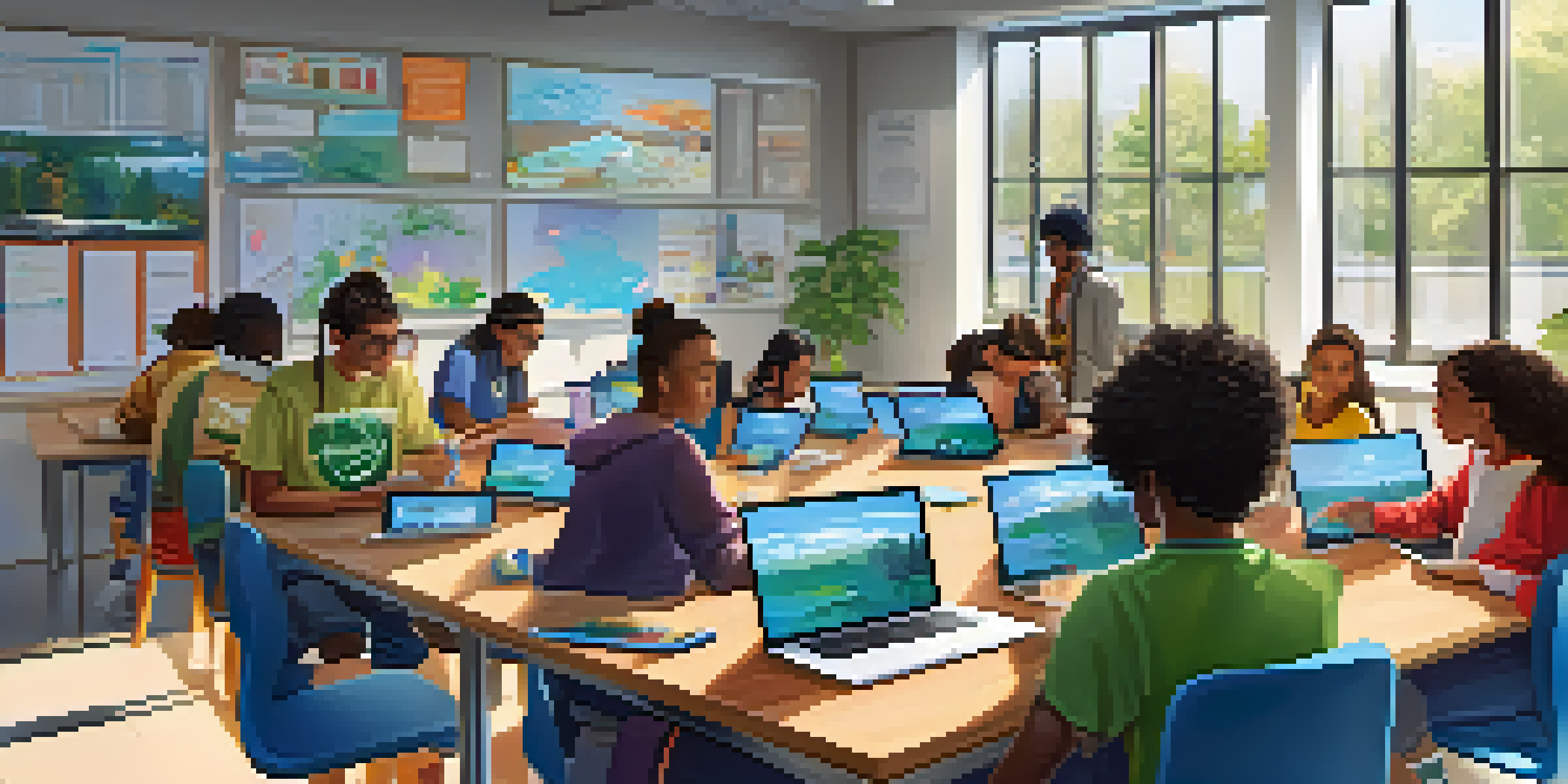The Role of Digital Citizenship in Collaborative Learning Environments

What is Digital Citizenship and Why Does It Matter?
Digital citizenship refers to the responsible use of technology and the internet. It encompasses various skills, behaviors, and knowledge that enable individuals to engage effectively online. In a world where digital interactions are commonplace, understanding digital citizenship is crucial for fostering respectful and positive online communities.
Technology is best when it brings people together.
Being digitally literate means knowing how to navigate online spaces safely and ethically. This involves understanding privacy, security, and the importance of critical thinking when consuming information. By promoting digital citizenship, educators help students not only to thrive academically but also to build a foundation for their future interactions in the digital realm.
Ultimately, digital citizenship serves as a guide for how we communicate, collaborate, and create online. It emphasizes the importance of empathy, respect, and responsibility, which are essential for any collaborative learning environment. Without these principles, online collaborations can quickly devolve into misunderstandings or conflicts.
The Intersection of Digital Citizenship and Collaboration
Collaboration in a digital space often involves working with individuals from diverse backgrounds and cultures. Digital citizenship plays a pivotal role in ensuring that these collaborations are effective and inclusive. When participants understand and practice digital citizenship, they are more likely to engage respectfully and constructively with one another.

Moreover, embracing digital citizenship fosters a sense of community among collaborators. For instance, when students are taught about the importance of shared norms and values in digital communication, they develop a stronger bond that enhances their collaborative efforts. This shared understanding can lead to more innovative solutions and richer discussions.
Importance of Digital Citizenship
Digital citizenship is essential for responsible technology use, fostering respectful online communities.
Thus, the essence of collaboration in digital environments hinges on the principles of digital citizenship. It forms the backbone of successful teamwork, allowing participants to leverage their unique strengths while respecting each other's perspectives. This synergy is essential for achieving common goals in any learning environment.
Building a Culture of Respect in Online Collaborations
A culture of respect is vital for effective online collaboration. When individuals practice digital citizenship, they contribute to an environment where everyone's voice is valued. This respectful atmosphere encourages open dialogue, allowing for diverse opinions and ideas to flourish without fear of judgment.
The internet is a powerful tool, but it can be a dangerous place if users are not equipped with the skills to navigate it responsibly.
One way to build this culture is through setting clear expectations and guidelines for online behavior. Educators and facilitators can introduce norms that promote respectful communication, such as active listening, constructive feedback, and refraining from negative comments. By modeling these behaviors, they help students internalize the importance of respect in all interactions.
Additionally, celebrating and acknowledging positive contributions can reinforce this culture of respect. When team members recognize each other's efforts and successes, it fosters a sense of belonging and motivation. In turn, this positivity enhances the overall quality of collaboration and learning experiences.
Fostering Critical Thinking and Media Literacy
Digital citizenship also emphasizes the importance of critical thinking and media literacy. In collaborative learning environments, individuals encounter a plethora of information from various sources. Being able to discern credible information from misinformation is essential for informed decision-making and collaboration.
By cultivating critical thinking skills, educators empower students to analyze and evaluate the information they encounter online. This skill is invaluable, especially when working on group projects that require synthesizing diverse viewpoints and data. It also encourages learners to ask questions and engage deeply with the subject matter.
Collaboration and Respect
Effective online collaboration thrives in a culture of respect, built on shared norms and values.
Furthermore, media literacy equips students with the tools to understand the influence of media on public perception and opinion. By fostering these skills, collaborative teams can engage in richer discussions and make more informed choices. Ultimately, this leads to higher-quality outcomes in their projects and discussions.
Encouraging Safe and Responsible Online Behavior
Safety is a key component of digital citizenship, especially in collaborative settings. Individuals need to understand how to protect their personal information and recognize potential online threats. Being aware of these risks not only safeguards individual users but also contributes to the overall security of the collaborative environment.
Educators can play a crucial role by teaching students about best practices for online safety. Topics such as recognizing phishing attempts, using strong passwords, and understanding privacy settings are essential knowledge for anyone participating in online collaborations. This proactive approach fosters a sense of responsibility among participants.
Moreover, when individuals feel safe in their online interactions, they are more likely to contribute fully and authentically. This sense of security can enhance creativity and collaboration, ultimately leading to more successful outcomes. Ensuring a safe online environment is a shared responsibility that everyone must embrace.
Leveraging Technology for Enhanced Collaboration
Technology plays a central role in facilitating collaboration in modern learning environments. Tools like video conferencing, collaborative documents, and project management software enable individuals to work together seamlessly, regardless of their physical location. However, effective digital citizenship is needed to ensure these tools are used responsibly and effectively.
When participants are equipped with digital citizenship skills, they can navigate these technologies with confidence. They learn how to use collaboration tools productively while respecting the contributions and ideas of others. This not only enhances teamwork but also maximizes the potential of the technology at hand.
Critical Thinking in Learning
Promoting critical thinking and media literacy equips learners to discern credible information and enhances collaborative projects.
Ultimately, leveraging technology in collaborative learning requires a balance between innovation and responsibility. Participants must be aware of the ethical implications of their digital actions, ensuring that they use technology to create positive, inclusive, and constructive learning experiences.
The Future of Collaborative Learning and Digital Citizenship
As we look to the future, the integration of digital citizenship in collaborative learning environments will become even more critical. With the rapid advancement of technology and the increasing prevalence of online interactions, the need for responsible digital behavior will only grow. Preparing learners for this reality is essential for their success in both academic and professional settings.
Furthermore, educators must continuously adapt their teaching strategies to incorporate the evolving landscape of digital citizenship. This includes staying informed about new technologies, trends, and challenges that learners face in online collaborations. By doing so, they can better equip students with the skills they need to thrive.

In conclusion, the role of digital citizenship in collaborative learning environments is multifaceted and essential. By fostering a culture of respect, encouraging critical thinking, and promoting safe online behavior, we can create enriching learning experiences that prepare individuals for the digital age ahead.